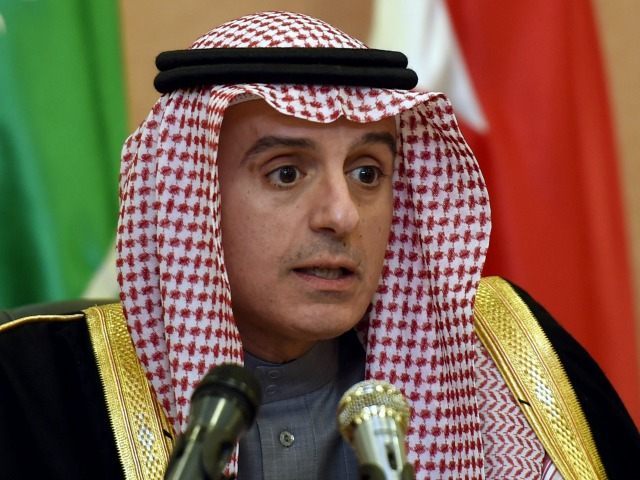Saudi Arabia’s Foreign Minister Adel al-Jubeir told a German newspaper Tuesday that his government is “ready to send ground troops” to fight the Islamic State in Syria if necessary.
The interview appeared in the German publication Sueddeutsche Zeitung; several English-language publications have since published translations of the remarks. Al-Jubeir tells the newspaper that not only Saudi Arabia, but other Gulf nations are willing to lend troops to a U.S.-led coalition against the Islamic State in the country, while insisting that Syrian dictator Bashar al-Assad must also leave power.
“The Kingdom and other Gulf states have declared that we are ready to participate with special forces on the side of the USA,” al-Jubeir said. “some countries of the Islamic coalition against terrorism and extremism are willing to provide troops.” The Foreign Minister noted that the Trump administration is in the midst of rewriting the plan to liberate Syria from the Islamic State, so Riyadh and its allies are waiting to see what the White House proposes.
Of Assad — a longtime ally of Saudi Arabia’s regional rival Iran — al-Jubeir says, “Assad has no future after all the crimes committed in Syria — responsible for 600,000 dead, twelve million refugees and the destruction of his country.”
The Iranian state outlet PressTV noted that al-Jubeir expressed concern not only in eliminating the Islamic State, but in preventing liberated areas from falling into the hands of the Shiite terrorist group Hezbollah. Hezbollah, and other Shiite militia fighters, are active in Syria against the Sunni Islamic State, and most receive some form of support from Iran. Saudi intervention in Syria would hurt both Assad and his benefactors in Iran.
Saudi Arabia has long expressed a distant interest in involvement in the Syrian Civil War. In 2016, Saudi Arabia dispatched warplanes to ally Turkey in response to Assad’s bombing of Aleppo, along with Russian and Iranian allies. Reports began to circulate that Saudi Arabia was considering sending in ground troops, but they never materialized.
Unlike Riyadh, Ankara took the dive and sent ground troops across the Syrian border last year. President Recep Tayyip Erdogan declared the invasion’s objective was “to end the rule of the tyrant al-Assad,” though Erdogan also claims a role in liberating Raqqa from the Islamic State “because Turkey is a global power.”
Turkey’s role in Syria has brought it close to a confrontation with Iran. Last week, Turkish Foreign Minister Mevlut Cavusoglu warned that Iran was “destabilizing” the region by aiding Shiite militias and promoting “sectarian policy.” His Iranian counterpart warned Turkey not to “test Iran’s patience.” Erdogan visited Riyadh last week to discuss, among other things, cooperation in Syria.
A Saudi entrance into the Syrian war theater would entangle Riyadh in its second civil war in the region. Saudi troops entered Yemen in March 2015 in support of the legitimate Sunni government there, fighting against a Shiite Houthi rebel insurgency. Riyadh rallied a number of allies, including Sudan and Qatar, to send troops, and the United States parked a warship nearby for support. The Houthis receive economic and weapons support from Tehran and have dislodged the legitimate government from the capital, Sanaa. Yemeni President Abd Rabbo Mansour Hadi and his administration operate out of the southern city of Aden. The war has triggered a major humanitarian crisis in the country, with millions at risk of starvation.
In response, the Houthi fighters have attempted to attack Saudi Arabia, launching missiles towards the iconic Islamic city of Mecca.

COMMENTS
Please let us know if you're having issues with commenting.